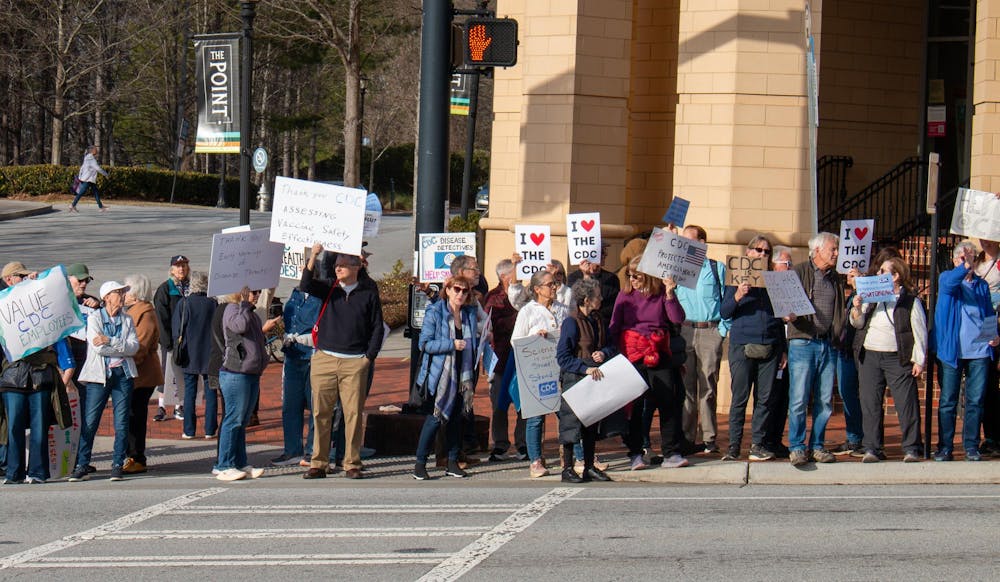Almost 200 people gathered to support the Centers for Disease Control and Prevention (CDC) across four street corners in front of the agency’s headquarters on Feb. 18. Cars honked in support of the CDC as they drove down Clifton Road, and protestors’ chants and cheers were deafening.
The protest comes after U.S. President Donald Trump has begun operations to cut 10% of the CDC’s workforce and limit National Institutes of Health (NIH) funding for “indirect costs” to 15% of grants. Previously, the government has capped indirect costs between 27% and 60%. Indirect costs are costs not directly related to research, such as staff salaries and utilities.
Emory University could be especially affected by NIH changes, as the University ranked among the top receivers of federal funding in 2023, obtaining over $485 million from the NIH. Federal funding encompassed almost half of the University’s total external research funding of $1.1 billion that year.
Protestors denounced the Trump administration with signs such as “Our democracy is under attack.” The scene was eerily familiar to one earlier this month, when protestors gathered in front of the CDC to oppose Robert F. Kennedy Jr.’s nomination to lead the U.S. Department of Health and Human Services, which has since been confirmed.
Julia Greenfield (25PH) said it was “absolutely heartbreaking” to see Trump’s cuts at the CDC. She discussed the importance of infectious disease-related research conducted at the CDC and the agency’s importance internationally.
Even in the midst of political change, Greenfield said that events like this protest have given her a newfound sense of validation in her passion for public health advocacy.
“Today we’re seeing a lot of validation that we haven’t had in a while,” Greenfield said. “After the election, I felt a bit outnumbered because it’s just really heartbreaking to have the field that you’re so passionate about be devalued and defunded.”
Haley Cionfolo (25PH) shared a similar sentiment, stating that the recent turmoil has been a “burden.” She added that it has been “hard to watch” the government constantly attack her passion and field in recent months.
Former CDC Senior Public Affairs Specialist Ryan Sloane was one of the over 1000 CDC employees who was laid off in the past few weeks. He said his termination paper indicated that he was fired for “poor performance” but Sloane questioned whether his termination was legal. Sloane believes that firing researchers and scientists is not making the government more efficient and is instead causing “chaos and fear.”
“I’m fighting for this job,” Sloane said. “I’m not giving it up without a fight. But they can’t fire me twice.”
Sloane acknowledged that he only spent two months as a CDC employee after a lengthy interview process. He expressed concern for longtime employees at the agency.
“People who are still with the agency [who] have 30 years of time under their belt dedicated to public health — they’re terrified,” Sloane said. “They’re terrified for their work. They’re terrified for their careers. They're terrified for the impact it will have to the American people.”
However, not all attendees opposed the Trump administration’s public health policy. Vaccine skeptic Mike Arnold attended the CDC protest to support Kennedy and Trump.
Arnold, who said he regularly protests outside the CDC, attributed his skepticism toward vaccines to his experience working with autistic children, which led him to believe vaccines are a cause of autism in children.
Arnold called the other protestors “misinformed.” He expressed his desire for the Trump administration to address the causes of autism in children, calling Trump’s win in the 2024 presidential election a moment of triumph. According to Arnold, some CDC employees who were fired may have been “honest” and “decent people,” but the CDC is “corrupt,” and people should stand up for what is “right.”
“If you don’t stand up for what’s right in life, you’re a nothing,” Arnold said, quoting entertainment businessman Aaron Russo.
The Mayo Clinic reported that studies have debunked the notion that vaccines cause autism.
Still, protest attendees like Resident Physician Sandra Carpenter, who has done research at Emory, remarked on the recent distrust in science and pointed out the vital role of public health officials in administering widespread interventions such as vaccines. Carpenter expressed hope that the demonstration would “raise the morale” at the CDC.
The protest outside of the CDC demonstrated varying views regarding public health. However, the undeniable support for the field shows some sign of unity in polarized times.
“We can’t survive without public health,” Cionfolo said. “We’re going to fight the good fight, and public health will prevail in one way or another.”

Jacob Muscolino (he/him) (28C) is a News Editor at The Emory Wheel. He is from Long Island and plans to major in History and Psychology. Outside of the Wheel, he is involved in Emory Reads and Emory Economics Review. You can often find Jacob watching the newest blockbuster for his Letterboxd, dissecting The New York Times and traveling to the next destination on his bucket list.






